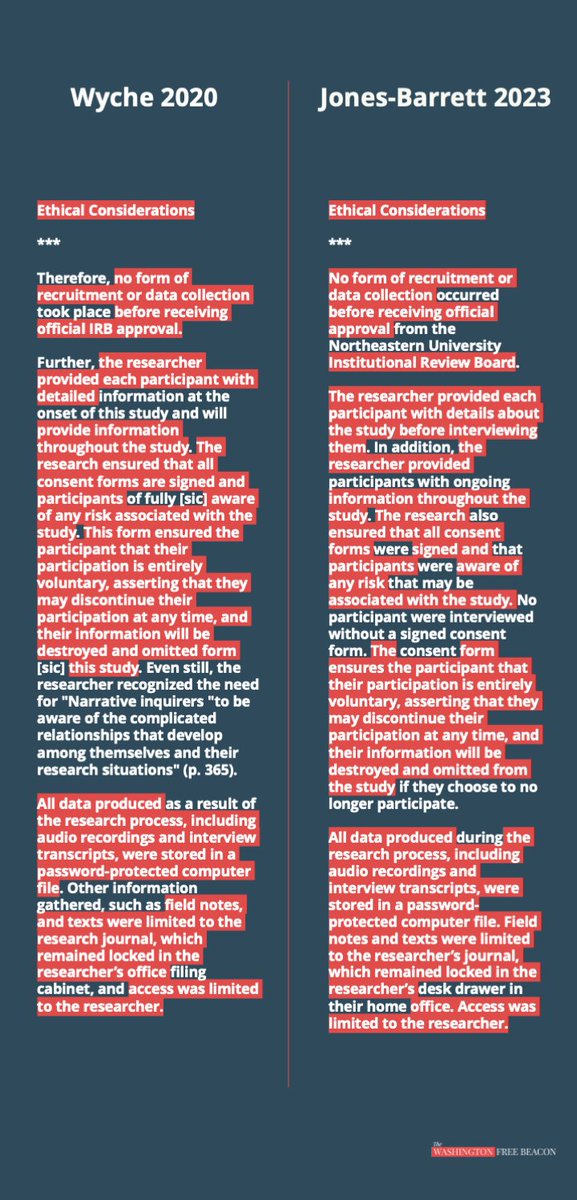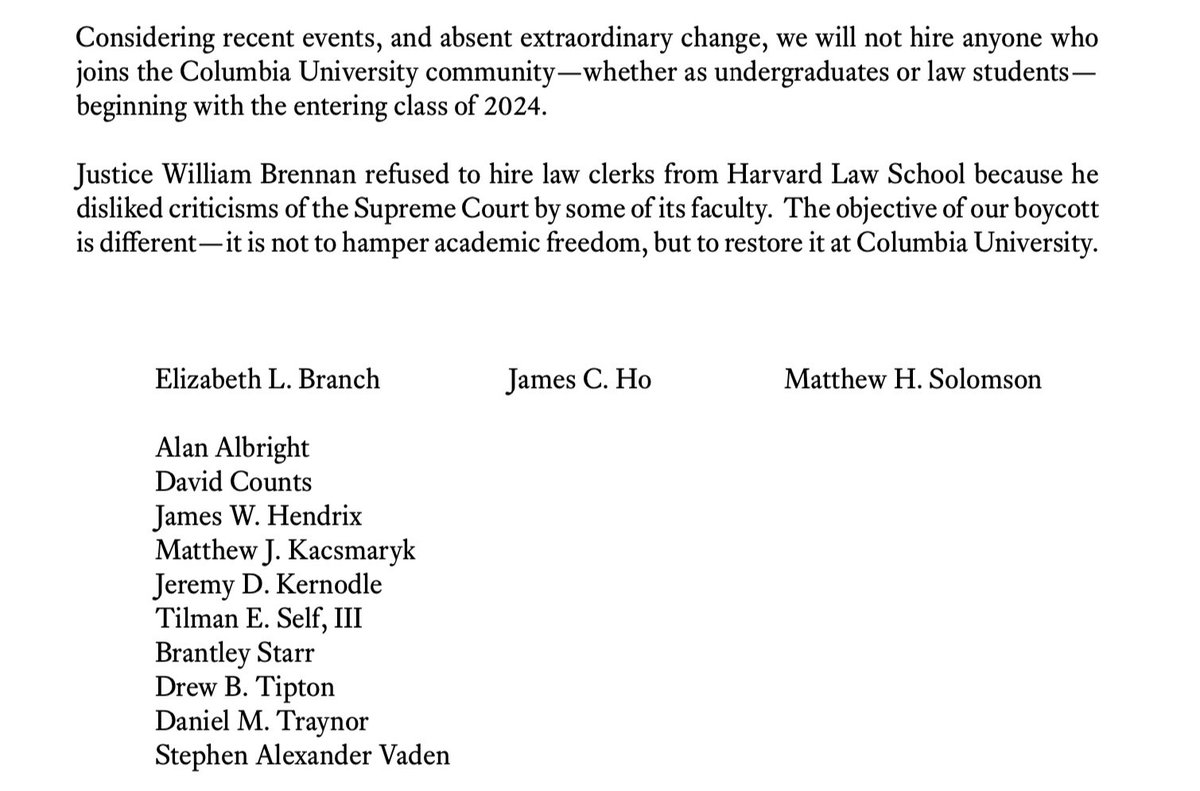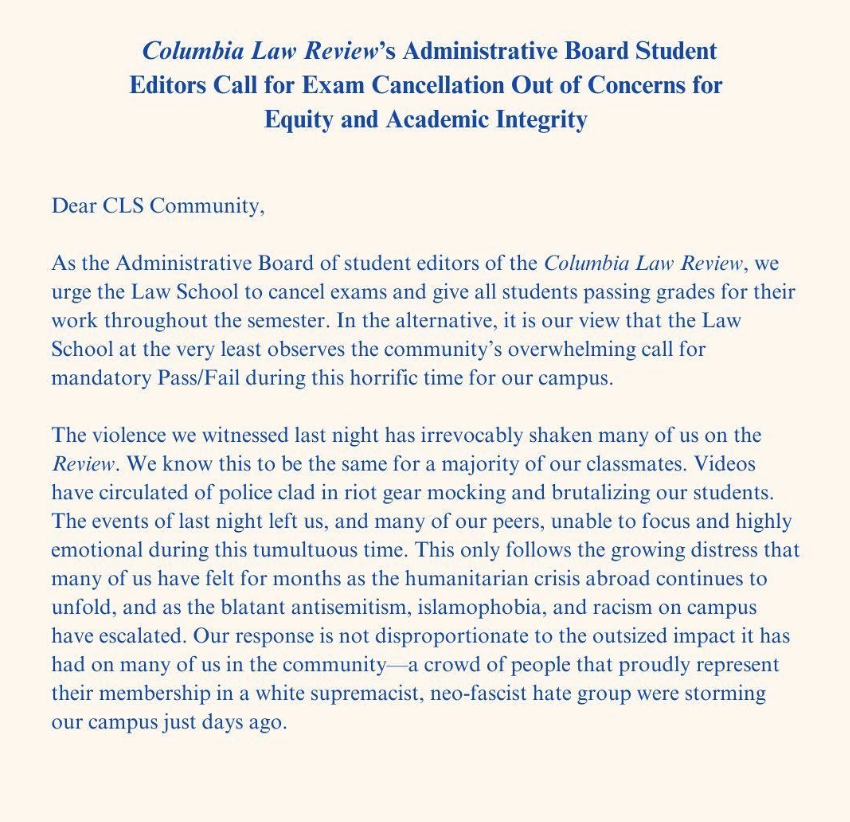NEW: In 2021, MIT hired six high-level DEI officials. Two of them now appear to be serial plagiarists.
One official, Tracie Jones-Barrett, copied an entire section on "ethical considerations" from a classmate in her Ph.D program.
Her dissertation's title? "Cite A Sista."🧵
One official, Tracie Jones-Barrett, copied an entire section on "ethical considerations" from a classmate in her Ph.D program.
Her dissertation's title? "Cite A Sista."🧵

In 2021, MIT welcomed six new deans of DEI, one for each of the institute's main schools, as part of a "DEI Strategic Action Plan" launched the previous year. The plan pledged to "make equity central" to the university "while ensuring the highest standards of excellence."
But according to a 71-page complaint filed with the university on Saturday, at least two of the six DEI officials may not be living up to those standards: In their doctoral dissertations, Tracie Jones-Barrett and Alana Anderson copied pages of material from other scholars.
In her 2023 dissertation titled "Cite a Sista," Jones-Barrett, MIT’s deputy "equity officer," lifts a whole section on "ethical considerations" from Emmitt Wyche III, her classmate in Northeastern University's Graduate School of Education, without any sort of citation. 

The section is one of several long passages taken from Wyche's 2020 thesis, "Boyz in the Hoods: (Re) Defining the Narratives of Black Male Doctoral Degree Completers," which does not appear in Jones-Barrett's bibliography. 

Anderson, who served as the diversity czar for MIT's computer science college until last year, when she left to become Boston Beer Company's inclusion and belonging program manager, likewise copied copious material from other scholars. 

Her 2017 dissertation, "#BLACKONCAMPUS: A Critical Examination of Racial and Gender Performances of Black College Women on Social Media," lifts over a page of material from Mark Chae, a professor of counseling at Pillar College, who is not cited anywhere in her dissertation. 

"It would have been nice to at least get a citation!" Chae told the Washington Free Beacon in an email. "Anderson seems quite comfortable in taking credit for large portions of another writer's scholarly work."
Anderson, who held DEI posts at Boston University and Babson College before coming to MIT, lifts another long passage from Jarvis Givens, a professor at the Harvard Graduate School of Education, without an in-text citation. 

The omissions appear to violate MIT's plagiarism policy, which states that scholars must cite their sources any time they "use the words, ideas, or phrasing of another person." 

In total, the two diversity deans lifted about 10 full pages of material without attribution, according to the complaint, as well as dozens of shorter passages sprinkled throughout their theses.
Like former Harvard president Claudine Gay, Anderson even stole language from another scholar's acknowledgments, copying phrases and sentences used by Khalilah Shabazz, now a DEI official at Indiana University-Purdue University Indianapolis, to thank her dissertation advisers. 

The lift was executed clumsily: Anderson's acknowledgments contain several typos not seen in Shabbaz's, including missing words and commas and a lack of subject-verb agreement. 

Saturday's complaint is the latest in a string of plagiarism allegations against campus diversity officials. Since Gay's resignations, DEI officers at Harvard, Columbia, the University of Wisconsin-Madison, and the UCLA have been accused of research misconduct.
The accused administrators have not been publicly sanctioned by their universities, which have either declined to comment on the allegations or issued statements in support of the officials.
The complaint against Anderson and Jones-Barrett may be harder for MIT to brush aside, however, given its high-profile efforts to distance itself from DEI in the post-October 7 era.
MIT said this month that it would no longer require DEI statements from candidates applying to faculty positions, making it the first elite school to axe the practice. It also led the way in restoring the SAT requirements axed by many colleges in an effort to boost diversity.
The pushback has come largely from MIT faculty and been driven, in part, by a sense that DEI programs excuse and even encourage anti-Semitism.
An April article in MIT's faculty newsletter noted that an event on "Jewish inclusion" had whitewashed the rhetoric of the school's pro-Palestinian protesters, who have occupied campus buildings, called for "Intifada revolution," and allegedly chanted "death to Zionists."
"Jewish students," a blurb for the DEI event read, "are encountering much of the same discomfort that other minorities face on campus and in the world, in that they don't feel heard or acknowledged."
The two dissertations at issue are strikingly derivative, cobbled together from classmates, online sources, and even a book's dust jacket, and at times read like replicas of their unattributed source material.
Jones-Barrett's summary of her dissertation, for example, is nearly identical to the summary Wyche provides of his own. 

Both papers use "semi-structured interviews" to "gather insights" from black graduates of Ph.D. programs about their "subjective experiences" of "meaning-making," or, as Wyche misspells it, "mean-making." 

The primary difference is that Wyche's study deals with black men, while Jones-Barrett's deals with black women.
"This study, the first of its kind[,] uses Black Feminist Thought as a framework to explore and investigate how Black women at Ivy League graduate schools of education make meaning of thriving," reads the first sentence of Jones-Barrett's dissertation, which is missing a comma.
"There are limited studies that center the voices of Black women at Ivy League graduate schools and there are no studies that look specifically at Ivy League graduate schools of education."
Jones-Barrett, who has taught courses at Harvard Extension School and was initially hired as the DEI czar for MIT's humanities programs, also poached a passage on "potential research bias" from Wyche—now a DEI consultant who on LinkedIn calls himself as a "status quo disrupter." 

He's not the only classmate she plagiarized: On p.1 of her dissertation, she lifts an entire paragraph from Scott Fitzsimmons, who earned his PhD in education from Northeastern, without attribution, swapping out "rural EMS leaders" for "Black women in graduate programs." 

Anderson, meanwhile, lifts several paragraphs from a 2016 ThinkProgress article about her alma mater, Boston College, from which some of her study's interview subjects were drawn. 

That plagiarism undercuts her effort to prevent the school, to which she refers with a pseudonym, from being identified—a possible violation of the study's consent form, which promised participants that no "identifying information" would be disclosed. 

Anderson—who runs her own consultancy that offers "scientifically-based" DEI programming—also borrows three sentences from the dust jacket of Ebony and Ivy, a 2013 book by MIT historian Craig Wilder, who is only cited in one of the sentences (without quotation marks). 

Like many of the authors plagiarized by Gay, Wilder defended Anderson's decision to copy his work, writing in an email that he didn't think a citation was necessary.
"I cannot imagine why anyone would cite a dust jacket, nor do I see the urgency of criminalizing the failure to do so," Wilder told the Free Beacon. "I'm honored," he added, when other scholars "find inspiration from my publications."
Read the full story in the @FreeBeacon:
And head on over to this link to peruse the 71-page complaint: freebeacon.com/campus/mit-hir…
freebeacon.com/wp-content/upl…
And head on over to this link to peruse the 71-page complaint: freebeacon.com/campus/mit-hir…
freebeacon.com/wp-content/upl…
• • •
Missing some Tweet in this thread? You can try to
force a refresh








